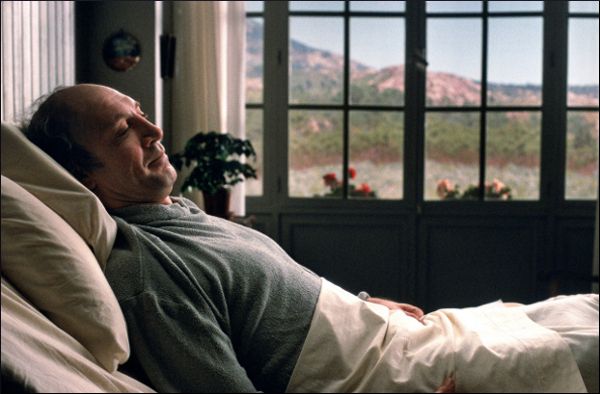In the green and blue landscape of Galicia, amidst Gaelic music, and with nostalgia for this melancholic land, Mar Adentro (The Sea Inside) tells the real story of Ramón Sampedro (Javier Bardem), a lively sailor who breaks his back when, one fateful day in 1968, he jumps from a cliff into the sea, believing the water to be deep enough. For 28 years, he is confined to a bed, until he decides to fight against his family, society, and the courtrooms to earn a right he considers basic: the right to end his life.
"The real-life case of Ramón Sampedro clashed with Spanish society, which is deeply rooted in Catholicism and which considered euthanasia morally wrong."
When he requests help, several people appear: Gené (Clara Segura) and her husband Joaquín (Joan Dalmau), who try to fight for his cause in the tribunals; Julia (Belén Rueda), a lawyer who suffers a degenerative disease and who identifies with Ramón (she is based on the journalist Laura Palmés, who suffered from multiple sclerosis and authored a famous article on euthanasia); and Rosa (Lola Dueñas), a humble single woman with two children who works for a small radio station and has a great affection for the handicapped man. While Julia convinces Ramón that his writings deserve to be published, Gené and her husband lose the case in the tribunals, as Ramón anticipated. Julia is determined to help him die and then commit suicide herself after publishing her book, though she eventually changes her mind on this last point. But it is Rosa who seems likeliest to help Ramón achieve his goal.

The real-life case of Ramón Sampedro clashed with Spanish society, which is deeply rooted in Catholicism and which considered euthanasia morally wrong. It’s difficult to determine whether or not a quadriplegic has a right to commit suicide. The real Sampedro found it torturous having to thank everyone around him every day of his life for everything they did for him. He did not want to depend on anybody. This frustration was very well conveyed in his book Cartas desde el infierno (Letters From Hell), a collection of letters, short stories, and poems. His family considered him a selfish person for wanting to deprive them of his presence. But he believed his family and society were the selfish ones, since they wanted to see him suffering and incapable of doing anything. He thought real love was not wanting him around, but understanding that people have to be free to do as they wish.
Sampedro was a well-educated man with a great sensibility, a very appealing personality (he always had many women around him, before and after his accident), and an impressive skill for philosophy (as he himself said, “I have a lot of time for thinking”). His main intention was to demonstrate that he was reasonable and coherent enough to be in a position in which he could ask for death. And so it remained until his last day, in which he recorded a video to show everyone that he was voluntarily drinking a lethal dose. Assisted suicide is still illegal in Spain, but Sampedro’s collaborator was never found.
"Alejandro Amenábar treats this sensible topic accurately and fairly, which helped his career ascend into the ranks of the most prominent Spanish directors"
Mar Adentro (the title derives from a line in one of Sampedro’s poems) gained the favor of critics and the general public alike. Bardem’s performance (the Spanish actor had to put up with 5 hours of make-up every day) is brilliant, and Alejandro Amenábar treats this sensible topic accurately and fairly, which helped his career ascend into the ranks of the most prominent Spanish directors (as he had already proved it could with his previous Abre los ojos). Amenabar also composed the music, for which he won a Goya Award (the Spanish Oscars), and at the Academy Awards, Mar Adentro won the prize for Best Foreign Language Film.
As for the language, 80% of the characters are from Galicia, which has one of the most difficult and strongest accents in Spain. However, most of the actors are from other parts of the country. This was a particularly big challenge for Javier Bardem, who is so-so in his attempts to convince the audience that he is from Galicia (although, to his benefit, he only has to say very short sentences). At times he succeeds, and at others, not so much, although he is decent enough in his conversations in Galician with his father. However, Lola Dueñas is amazingly good with her accent. Joaquín and Gené, meanwhile, have some dialogues in Catalan, for which the movie uses subtitles, and Belén Rueda has a more neutral accent.




